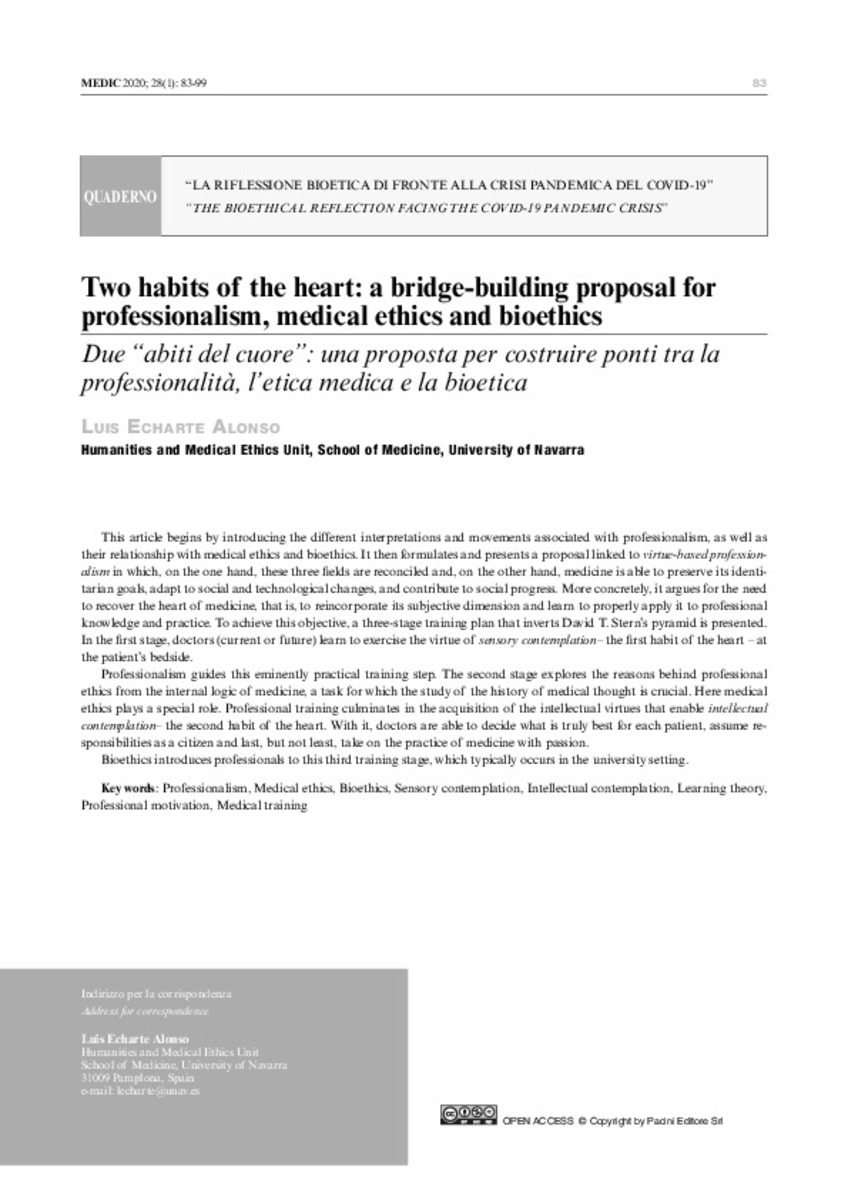Full metadata record
| DC Field | Value | Language |
|---|---|---|
| dc.creator | Echarte-Alonso, L.E. (Luis Enrique) | - |
| dc.date.accessioned | 2020-12-11T16:14:56Z | - |
| dc.date.available | 2020-12-11T16:14:56Z | - |
| dc.date.issued | 2020 | - |
| dc.identifier.citation | Echarte-Alonso, L. (Luis Enrique), Two habits of the heart: a bridge-building proposal for professionalism, medical ethics and bioethics, 2020. | - |
| dc.identifier.issn | 1824-3991 | - |
| dc.identifier.uri | https://hdl.handle.net/10171/59895 | - |
| dc.description.abstract | This article begins by introducing the different interpretations and movements associated with professionalism, as well as their relationship with medical ethics and bioethics. It then formulates and presents a proposal linked to virtue-based professionalism in which, on the one hand, these three fields are reconciled and, on the other hand, medicine is able to preserve its identitarian goals, adapt to social and technological changes, and contribute to social progress. More concretely, it argues for the need to recover the heart of medicine, that is, to reincorporate its subjective dimension and learn to properly apply it to professional knowledge and practice. To achieve this objective, a three-stage training plan that inverts David T. Stern’s pyramid is presented. In the first stage, doctors (current or future) learn to exercise the virtue of sensory contemplation– the first habit of the heart – at the patient’s bedside. Professionalism guides this eminently practical training step. The second stage explores the reasons behind professional ethics from the internal logic of medicine, a task for which the study of the history of medical thought is crucial. Here medical ethics plays a special role. Professional training culminates in the acquisition of the intellectual virtues that enable intellectual contemplation– the second habit of the heart. With it, doctors are able to decide what is truly best for each patient, assume responsibilities as a citizen and last, but not least, take on the practice of medicine with passion. Bioethics introduces professionals to this third training stage, which typically occurs in the university setting. | - |
| dc.description.abstract | L’articolo analizza, in primo luogo, la professionalità medica contemporanea, nei suoi diversi movimenti e interpretazioni, nonché il suo rapporto con l’etica medica e la bioetica. In secondo luogo, viene formulata una proposta, collegata alla professionalità fondata sulle virtù, che, da un lato, armonizza i tre ambiti sopra citati e, dall’altro, rende la professione medica in grado di preservare i suoi scopi originari, adattandosi ai cambiamenti sociali e tecnologici e di collaborare al progresso sociale. Più specificamente, in questa proposta si sostiene la necessità di restituire il cuore alla medicina, cioè di riabilitare la dimensione soggettiva e di imparare a integrarla correttamente nella conoscenza e nell’agire professionale. Per raggiungere questo obiettivo, viene postulato un particolare progetto formativo a tre fasi in cui viene invertita la piramide professionale di David T. Stern. Nella prima, il medico impara a esercitare, al capezzale del paziente, la virtù della contemplazione sensoriale – il primo abito del cuore. La professionalità guiderà questa fase di formazione eminentemente pratica. Nella seconda fase, verrebbero esplorate le ragioni dell’etica professionale entro la logica interna della medicina, un compito per il quale lo studio della storia del pensiero medico è fondamentale. Qui l’etica medica gioca un ruolo speciale. La formazione professionale culmina nell’acquisizione di quelle virtù intellettuali che consentono la contemplazione intellettuale – il secondo abito del cuore. Grazie a esso, il medico è in grado di decidere cosa è veramente meglio per ogni paziente, di assumersi le sue responsabilità come cittadino e, aspetto non meno importante, di fare della medicina una passione. In questa terza fase formativa che è tipicamente universitaria, la bioetica riveste un ruolo prioritario | - |
| dc.language.iso | en | - |
| dc.rights | info:eu-repo/semantics/openAccess | - |
| dc.subject | Professionalism | - |
| dc.subject | Medical ethics | - |
| dc.subject | Bioethics | - |
| dc.subject | Sensory contemplation | - |
| dc.subject | Intellectual contemplation | - |
| dc.subject | Learning theory | - |
| dc.subject | Professional motivation | - |
| dc.subject | Medical training | - |
| dc.subject | Professionalità | - |
| dc.subject | Etica medica | - |
| dc.subject | Bioetica | - |
| dc.subject | Contemplazione sensoriale | - |
| dc.subject | Contemplazione intellettuale | - |
| dc.subject | Motivazione professionale | - |
| dc.title | Two habits of the heart: a bridge-building proposal for professionalism, medical ethics and bioethics. | - |
| dc.title.alternative | Due “abiti del cuore”: una proposta per costruire ponti tra la professionalità, l’etica medica e la bioetica | - |
| dc.type | info:eu-repo/semantics/article | - |
| dc.relation.publisherversion | http://www.medicjournalcampus.it/archivio-rivista/2020/volume-28-giugno-2020/ | - |
| dc.description.note | Licencia CC BY NC ND | - |
| dadun.citation.endingPage | 99 | - |
| dadun.citation.number | 1 | - |
| dadun.citation.publicationName | Medic (metodologia didattica e innovazione clinica) | - |
| dadun.citation.startingPage | 83 | - |
| dadun.citation.volume | 28 | - |
Files in This Item:
Statistics and impact
Items in Dadun are protected by copyright, with all rights reserved, unless otherwise indicated.






